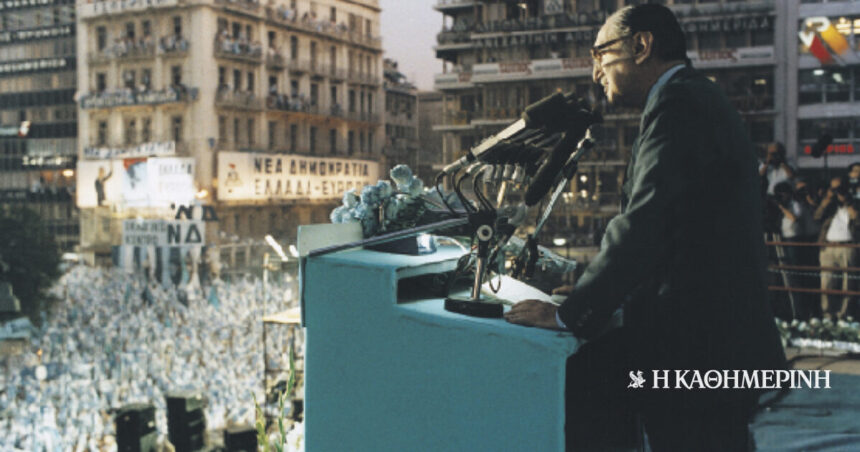Evangelos Averof-Tositsa is a peculiarity in modern Greek political history; not unique, perhaps, but really very special. He defined with his choices the country’s course at various levels and at various times. When, on August 28, 1984, he resigned from the New Democracy leadership, a major turning point was marked in Greek political history: never until then, a politician with such a great influence on the events had not left without emerging in the prime minister. Many of the politicians who had served as prime ministers had less influence on political affairs than Averoff.
Resistant action in possession
Averoff began engaging in politics from the area of Alexander Papanastasiou’s Jacobic Venizelists during the interwar period. But his fate had great difficulties: he was ill with tuberculosis, then he did brilliant studies in Switzerland, where he was proclaimed a Doctor of the University of Lausanne in 1933 with a study on the conditions of the Balkan cooperation and awarded by the Balkan Cooperation. But upon his return to Greece he was hit by a new tuberculosis crisis, which limited him to “hygiene” Kifissia and seemed to be deprived of any public outlook.
The “organizational founder” of ND He resigned from the presidency after the defeat in the 1984 European elections.
In the 1930s, he discovered Metsovo’s ancestral heritage – in his healthy climate to seek refuge – and began his communication with Baroness Michael Tositsa, who would escalate in the creation of the bequest for Tositsa for the Tositsa. In 1940, due to his health problems, he was not allowed to serve in the army, but took over unorthodox warfare in Albania. In 1941-42, during the Occupation, he was actively resisted as a prominent member of the Greek community of Greece, in the penetration of the Romanian Vlachs and the Italian policy that favored them: he was arrested, displaced in a concentration camp in Italy, passed by a third crisis of the Greek. Resistance organization of escape in occupied Rome, an action for which he was decorated by the British. The badge returned when the executions of the EOKA fighters in Cyprus began in 1956.
Entry into politics
After the war, alongside Sophocles Venizelos and the Liberal Party (in 1946-48, the Venizelian Liberal Party) was one of the most prominent reformers in the center. He was elected to Parliament in 1946, served in ministerial shots in 1950-51, but in 1951, in the Plastira-Venizelos government, he accepted his hierarchical degradation to the position of Deputy Foreign Minister to serve the country’s major walk for NATO. He was one of the closest associates of Sophocles Venizelos at this time.

She joined Karamanlis’ ERE in 1956 and became a leader. Initially he undertook the Ministry of Agriculture – always interested in him – but while offering important work in the short time he served there, especially on the crucial issue of implementing scientific methods and agriculture, the Cyprus crisis in 1956 brought him to his office. From this position, it made critical options for the country: the dramatic march to Cyprus independence, the choice of the country’s connection to the EEC, its upgraded presence in the Western world institutions. He was widely respected by his colleagues in Western countries: in the early 1960s, his name was also discussed as part of the search for a new NATO Secretary -General.
From the post of Foreign Affairs, it made critical options for the country: the course to Cyprus independence, the choice of the country’s connection to the EEC, its upgraded presence in the Western world institutions.
Secured the Karamanlis Return in 1974
In the period after 1963 he faced the slanderous attacks of his political opponents on his policy, even for “scandals” in the ministry. It was one of the most difficult times of his life, as he had to resist his ethics effort. Following the imposition of the dictatorship in 1967, he was arrested and his absence was considered critical to the failure of King Constantine’s attempt to overthrow the Hunts in December of that year. In the following years, he promoted the policy of the “bridge”, which aimed to persuade the dictators to truly hand over power to Con. Karamanlis before a national disaster occurred, as in the end it came. When his attempt to persuade the junta to hand over power, he turned to the choice of dynamic overthrow as a political adviser to the Navy movement in 1973, after which he was re -arrested.

On July 23, 1974, after the junta’s decision to hand over power, there was the man who determined the developments by ensuring Karamanlis’ return from Paris. During the Democratic transition he probably had the most difficult role, that of the Minister of National Defense: Together with Solon Gika, the Minister of Public Order, they prevented a series of Hunts’ attempts to overthrow the government or to assassinate the prime minister and secured his rebellion. 1975). In the following years, he ensured the high readiness and great militant value and reliability of the Armed Forces at a time, after the Turkish invasion of Cyprus, during which a clash in the Aegean could not be ruled out. It also created the structures of a high -tech defense industry, but it did not evolve well in the coming years. However, he was not elected to the Prime Minister in May 1980, when George Rallis prevailed with just four votes.
As a National Defense Minister, after 1974 he secured the great militant value of the Armed Forces at a time, after the Turkish invasion of Cyprus, during which a clash in the Aegean could not be ruled out.
Enclosure and reconstruction
Averoff assumed the leadership of the ND Perhaps in its most difficult time, after an overwhelming election defeat, while PASOK’s rise was raised by Andreas Papandreou. Averoff chose a double strategy: on the one hand, he attempted a “encirclement” of the space to rebuild his strengths, on the other hand, he led a huge effort to re -establish. Indeed, ND, a loosely organized until then, has turned into a modern mass party under its leadership. UNNED was reorganized as well as the student organization of the party, which acquired a massive presence at the universities for the first time since 1974. The Central Committee of Regional Organization (KEPO), under Ioannis Varvitsiotis, was set up, and a new organization and a new organization, Anna Psarouda-Benaki. The prevalence of Epaminondas Zafiropoulos at the Athens Bar Association in March 1983 was recognized as a bend. It would not be an exaggeration if it was noted that at the level of mass organization, Averoff was the real “organizational founder” of ND.
He led a huge effort to organize the New Democracy, which was converted into a modern mass party.
This intense effort was made while the party was shocked by serious discord problems and while he was facing serious health problems. Averoff even contributed to his personal property to address the financial problems of the ND. His big venture seemed to bear fruit when in the 1982 municipal elections by ND candidates. They increased the forces of the party, although they usually lost municipalities due to the cooperation of PASOK and the “other democratic forces” (in the well -known phrase of state television). Indeed, Averoff fought the municipal elections, although he had appeared the new problems of his health, and after the election he was forced to miss a two -month period abroad for medical reasons.
Expectation was not implemented
In view of the 1984 European elections, Averoff raised a political issue, stating that the match would take place “all the material” and hoping that a victory for his party would create the conditions for a “disharmony” between the House and the popular feel. This with the then current Constitution could allow the President of the Republic to call elections.

His expectation was not implemented. ND He came second, with 38.1% of the vote, while PASOK received 41.6%. This led to Averoff’s widespread challenge within the party. He consulted Karamanlis on whether he had to resign. Karamanlis had encouraged him to remain in previous cases, but now left the decision himself, which could be perceived as an indirect prompt to leave. After defeat, and given his burdensome health, the choice was about inevitable.
He did not abandon politics until his death in 1990. He was a fighter throughout his life, since his youth, when he fought the illness, until the times that determined the course of the country. Like all the leading politicians, it caused positive feelings and reactions. His course, however, has been widely recognized by friends, opponents and the scientific community.
*Mr. Evanthis Chatzivasiliou is a professor in the Department of History and Archeology of the University of Athens, Secretary General of the House of Representatives for Parliament and Democracy.






